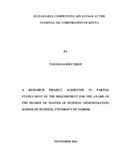| dc.description.abstract | The main objective was to establish the competitive strategies used by NOCK in order to
operate and remain competitive in the oil industry. Every business organization strives
for competitive advantage by providing superior value to the market place which in turn
enhances the profitability level of the firm. Specifically the study sought to the strategies
adopted by NOCK in the competitive oil industry in Kenya and whether in the execution
of those strategies there were any challenges encountered and how the same challenges
were being mitigated by NOCK in order to remain competitive and remain relevant in the
eyes of the consumer. The study was carried out as a case study focussing on NOCK
among the oil firms in the Kenyan oil market and industry. Primary data was collected
from senior management staff by use of interview guide and secondary data and
information was picked from internal NOCK documents like strategic plan, industry
analysis reports as well as observations. A total of 4 interview guides were sent out and
administered out of which, 3 responded and 1 did not respond. All their responses were
analyzed putting the study’s response rate at 75%. The data was analyzed using content
analysis and information pertaining to the study objectives was presented. Research
findings showed that NOCK had adopted strategies that enhanced its competitive
advantage in the oil industry and that in the process of implementing the strategies to be
competitive, NOCK encountered a number of challenges and the most among them was
slow decision making process. Respondents showed that once a specific strategic
direction had been identified, it was not adopted immediately but had to go through an
elaborate bureaucracy hence lagging behind its competition. It was also determined that
the NOCK had put in place mitigating strategies in dealing with challenges. Key among
the strategies was the use of management tools like the balanced score card (BSC) to
assist in aligning strategy to targets. Research findings indicated that the balanced score
card approach had been implemented to align business activities to the vision and
strategy of the organization, improve internal and external communications, and monitor
organization performance against strategic goals. The research recommends that NOCK
should adopted a systematic thinking to guide the planning, implementation and followup
of human resource up-skilling efforts in the company. With serious effort on its part,
NOCK may be able to conduct systematic needs assessment procedures despite the
expected difficulties originating from the absence of information about basic skill
reservoir and career planning. This will empower unit managers and individual member
staff which in turn will shorten the cycle time for decision making so as to allow
anchoring of the competitive strategies and allow NOCK to stay ahead of its competition
in the oil industry. The research findings therefore addressed the research question(s)
under investigation and would be a practical tool to the practitioners of competitive
business strategies as firms strive to maintain and sustain competitive advantage in a
highly competitive industry like the oil industry in Kenya. | en_US |

